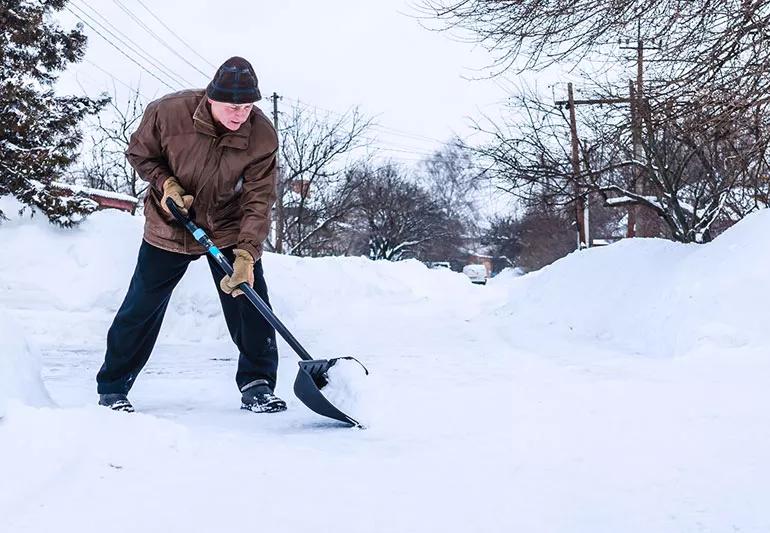This simple burst of hard work can put some of us at risk for heart attack

Image content: This image is available to view online.
View image online (https://assets.clevelandclinic.org/transform/c4219cfc-bd27-4369-a3f7-4aff8235f07d/elderlyShovelSnow-1128622547-770x533-1_jpg)
man shoveling snow
Waking up to find a thick layer of fresh, crisp snow covering your entire neighborhood can be breathtaking.
Advertisement
Cleveland Clinic is a non-profit academic medical center. Advertising on our site helps support our mission. We do not endorse non-Cleveland Clinic products or services. Policy
But while most of us are less-than-enthusiastic at the thought of clearing snow from our driveways, there’s a legitimate health reason to avoid this chore.
Experts caution that you have a heightened risk of having a heart attack after shoveling heavy amounts of snow.
Cardiologist Luke Laffin, MD, says many people underestimate just how strenuous snow shoveling can actually be.
“Snow shoveling is very similar to being at ‘peak exercise’ on a stress test, so it puts a lot of strain on your heart,” he says. “And for someone who isn’t used to actually exercising and being physically fit, it can predispose them to heart attacks.”
Dr. Laffin says any significant onset of chest pain, trouble breathing or pain that radiates down the arm or into the neck are hallmark signs of a potential heart attack. Those are reasons to stop and seek medical attention right away.
However, also be sure to brush up on other less common signs of a heart attack because not all of them have classic symptoms.
In addition, if you notice you’re getting tired more easily, feeling like a cold sweat is coming on or feeling light-headed, these could also be signs of a heart attack.
Shoveling itself isn’t necessarily bad for you — it’s more the conditions under which you’re shoveling that can cause cardiac events.
Advertisement
Too much exertion, too quickly, can trigger a heart attack — especially in the cold — when our arteries tend to constrict, which in turn, can drive up our blood pressure.
Your risk of a heart attack also increases if you’ve been more sedentary than usual in the winter months. (One more reason why you shouldn’t hibernate!)
Plan to (or need to) shovel anyway? Dr. Laffin says it’s important to weigh your risks and benefits and proceed accordingly. Try following these 5 tips:
Take your time shoveling. If you feel your body beginning to get tired, go inside. Rest for a little bit.
Try not to tackle your entire driveway all at once. Instead, Dr. Laffin says it’s smarter to divide up the work and take frequent breaks.
Stay warm (don’t forget to dress appropriately) and hydrate while shoveling snow. It’s critical.
If you or a loved one begins to show signs of heart trouble, or has trouble breathing after shoveling snow, call 911 immediately and seek medical care. If you’re not sure, it’s better to get it checked out.
If you have more than one medical condition or are over the age of 55, Dr. Laffin says it’s best to get someone else to shovel for you. It’s simply not worth the risk.
“Particularly people that have multiple medical conditions such as coronary artery disease or hypertension, or maybe they have overweight or obesity and don’t get a lot of physical activity — it’s not worth it to risk your heart,” he says.
“I think hiring the kid down the street to do it is a great idea,” Dr. Laffin says.
Advertisement

Delivered every Tuesday!
Sign up for our Health Essentials emails for expert guidance on nutrition, fitness, sleep, skin care and more
It's a letter about the news!
Learn more about our editorial process.
Advertisement
Having underweight, having overweight and having obesity can be dangerous for your heart
Resolve to move a little more, drink a little less, eat a little healthier, sleep a little better and destress a lot
Avoid smoking, eat a good diet and exercise to prevent your heart from aging prematurely
Enjoy the holidays while keeping your heart healthy
The short answer from an interventional cardiologist
6 tips that can help you slow things down
Diet, exercise and sleep all critical to heart health
The scoop on low-sodium diets
Type 2 diabetes isn’t inevitable with these dietary changes
Applying a hot or cold compress can help with pain
Pump up your iron intake with foods like tuna, tofu and turkey